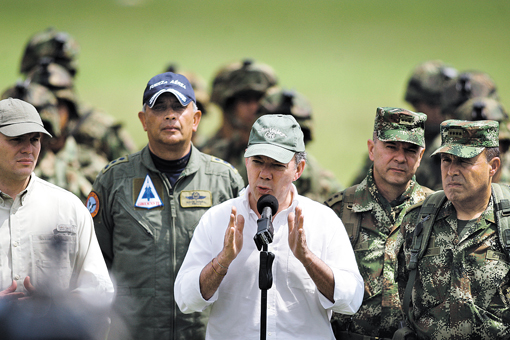On July 20, 2010, President Juan Manuel Santos promised the 9 million voters who had just elected him to his first term that he would build on the foundation created “by a giant, our President Álvaro Uribe.”1 He declared that Colombia could now look to the future with hope, thanks to the multiple successes that Uribe had achieved during his eight years in power.
In his televised speech to the nation that night, the president-elect also told Colombians that he would continue his predecessor’s “democratic security strategy” until the terrorist groups operating in the country accepted three specific conditions, the so-called tres inamovibles (three immovables). He listed them: (1) renounce kidnapping and terrorist acts against civilians; (2) stop child recruitment; and (3) renounce narcotrafficking.2
Since 2010, the story has encountered some unexpected twists. To start with, the relationship between Uribe and Santos is now completely broken, and there is no reason to expect the two men will patch up their differences. Second, Santos is pursuing negotiations with the Fuerzas Armadas Revolucionarias de Colombia (Revolutionary Armed Forces of Colombia—FARC)—and will probably soon enter into a conversation with the Ejércto de Liberación Nacional (National Liberation Army—ElN)—before the tres inamovibles have been met.
In its defense, the Santos administration claims that the circumstances were “right” to initiate the conversations and that it is in the best interest of the country to end the bloody conflict quickly. The government also argues that the economic benefits of peace will be enormous. Finance Minister Mauricio Cárdenas subsequently predicted to local financial reporters that a final agreement with the FARC will boost Colombia’s annual growth rate from current levels of 4.7 to 4.8 percent to 6 percent.3
I disagree. Here are four reasons why the government’s prediction of a peace dividend is exaggerated…





